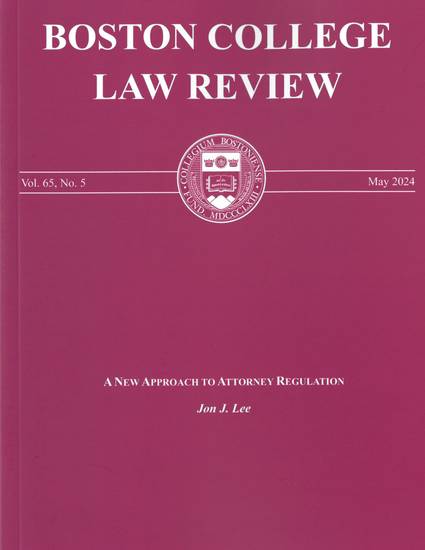
Article
A New Approach to Attorney Regulation
Boston College Law Review
(2024)
Abstract
For more than half a century, jurisdictions have relied on threats of disciplinary sanctions—sticks—to try to coerce attorneys to act in an ethical manner. In doing so, they have focused their efforts on establishing minimum standards of practice and sanctioning only those attorneys who fall well short of them. By crafting general rules that apply to all attorneys, however, jurisdictions have ignored the considerable differences that attorneys face as a result of their practice settings, years of experience, or individual identities. Furthermore, jurisdictions have struggled to establish clear standards to guide attorneys regarding their obligations—precisely because the settings in which their obligations arise are so complex. Perhaps no rule better epitomizes the deficiencies in this one-size-fits-all approach than the mandatory reporting rule, which has simultaneously created anxiety among attorneys about their reporting obligations and, with its strictures, engendered widespread noncompliance.But there are other ways to conceive of professional lawyer regulation than merely policing and sanctioning the worst offenders. Other legal and nonlegal systems have increasingly turned to carrots to motivate people to act in ways that will benefit the greater good. Thus far, however, lawyer regulators have continued to unthinkingly cling to—and often double down on—the use of sticks out of a belief that such sanctions are needed to convince the public that the legal profession can continue to regulate itself.This Article makes three primary contributions to the discourse on reforming professional lawyer regulation through the lens of the mandatory reporting rule. First, it demonstrates the deficiencies and limitations created by a stick-based system almost exclusively focused on sanctions. Second, it proffers an alternative model—one leveraging the use of carrots—and draws upon the rational choice literature to identify criteria for determining which type of incentive to implement. Third, it provides a template for how professional lawyer regulation can be revitalized by incorporating carrots that encourage attorneys to strive for ethical heights, rather than relying on sticks that induce attorneys to do just enough to avoid disciplinary action.
Keywords
- legal ethics,
- professional responsibility,
- sanctions,
- rational choice,
- regulation
Disciplines
Publication Date
May, 2024
Citation Information
Jon J. Lee. "A New Approach to Attorney Regulation" Boston College Law Review Vol. 65 Iss. 5 (2024) p. 1625 - 1694 Available at: http://works.bepress.com/jon-lee/14/
